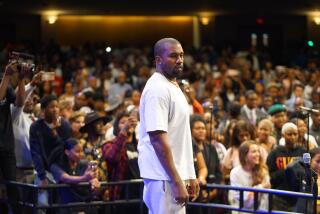Officials Address Missionaries’ Attitudes Toward Other Peoples
- Share via
NEW YORK — Take up the white man’s burden
Send forth the best ye breed,
Go, bind your sons to exile
To serve your captives’ need.
--Rudyard Kipling, 1899
They no longer speak of their task as “the white man’s burden,” but some missionaries, perhaps influenced by a decade often characterized by self-indulgence and national boosterism, are said to be exporting self-righteousness along with their religious beliefs.
The organizer of a conference this week on racism and ethnocentrism among missionaries said mission officials have noticed some evangelists are heading overseas with an inadequate respect for native cultures and beliefs.
“The Reagan years--I don’t know how else to say it--have lessened the sensitivities and commitment to this,” said Paul Yount of the National Council of Churches. “We’d thought we’d made some headway into this, but now we’re not so sure.”
Daniel Romero, general secretary of the mission program of the Board of World Ministries of the United Church of Christ, recalled being shocked when a missionary couple referred to Third World people as “heathens.”
“To have that terminology used now, I think, is an insult to the religious communities around the world,” Romero said.
Issues Raised at Workshop
Mission officials discussed issues of racism and ethnocentrism in missionary selection in a workshop earlier this week at Stony Point, N.Y. The meeting was sponsored by the Overseas Personnel Office of the Division of Overseas Ministries of the national council.
Member churches of the national council had some 4,300 missionaries overseas in 1985, slightly more than 10% of the total 43,000 Protestant missionaries, Yount said.
Yount, who is director of overseas personnel for the council, noted that many early missionaries took stands against colonial authorities and that missionaries have translated the Bible into almost every language and dialect.
“I would stress that the missionary heritage in this is both positive and problematic,” he said.
The conference was called because many mission officials believed that the new generation of missionaries lacked sensitivity toward native cultures, Yount said.
“The climate has changed,” he said. “There is not the more widespread concern about the racism within our own culture, classism within our own culture.”
Romero, however, said he thinks it is some of the older missionaries who “still carry some overtones of the past in which there is a bit of that white superiority that comes creeping in.”
He recalled, for example, how several such missionaries had joked about the odd names they had encountered overseas, despite the fact that they were making those remarks in the presence of natives of those countries.
“I don’t think they had the slightest notion it affected the people sitting there,” he said.
Julie Brown, vice president of the Division of Overseas Ministries for the Christian Church (Disciples of Christ), said that her experience was different, however.
“I think the missionaries that the Disciples are sending out today are less racist than the missionaries we were sending out 20 years ago,” she said.
‘Enrichment’ Is Goal
She said many missionaries from her church, appointed for specific terms and invited by overseas organizations, speak not in terms of “making a tremendous impact” on the places they visit but of enriching their local churches when they come back. Missionaries who say their only reason for going overseas is that they feel called by God “are the first people we weed out,” she said. “It usually means they have a paternalistic attitude.”
Romero sees hope for the future in the recruitment of younger missionaries and more members of minority groups.
“There is great value to having people who have lived with racism, who have lived with oppression in their own countries,” he said.
In addition, churches are adjusting to vast shifts in membership, with congregations swelling in Africa and Latin America as branches in Europe and the United States remain merely stable or, in some places, wither.
Brown noted that the Disciples of Christ will have more members in Zaire than in the United States by the year 2000, and that the denomination has cut its corps of overseas missionaries in half, to 110, over the past two decades.
Such changes have prompted new attitudes toward mission work, Yount said.
Participants at a recent meeting of the World Council of Churches agreed, he said, that “if we’re really going to have the sending of missionaries, we really need to have the exchange of missionaries.”
More to Read
Sign up for Essential California
The most important California stories and recommendations in your inbox every morning.
You may occasionally receive promotional content from the Los Angeles Times.













